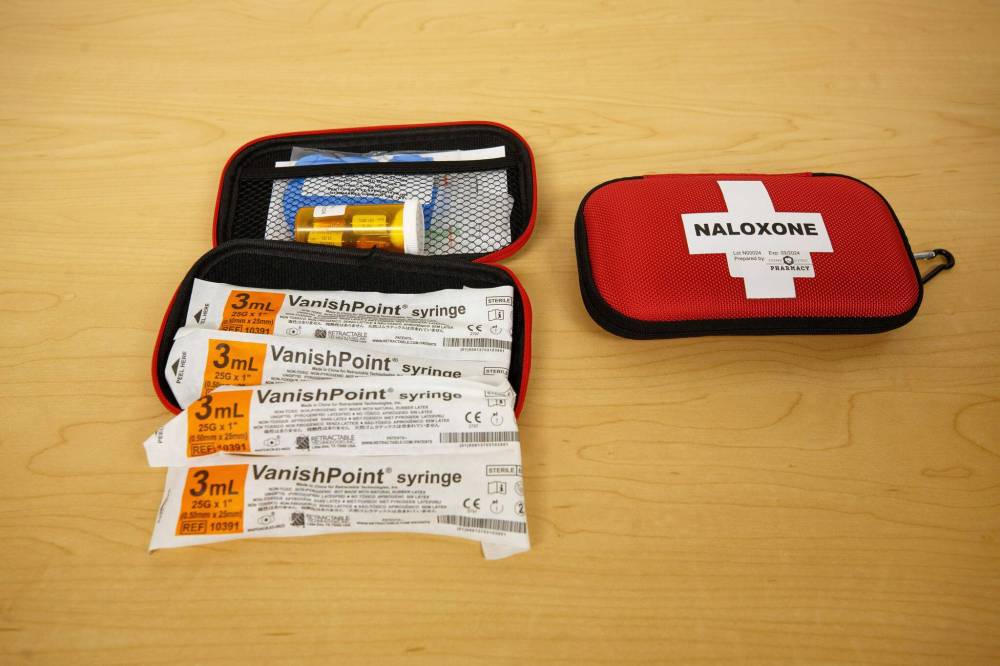Rates of street-drug poisoning increasing in Winnipeg
Advertisement
Read this article for free:
or
Already have an account? Log in here »
To continue reading, please subscribe:
Monthly Digital Subscription
$0 for the first 4 weeks*
- Enjoy unlimited reading on winnipegfreepress.com
- Read the E-Edition, our digital replica newspaper
- Access News Break, our award-winning app
- Play interactive puzzles
*No charge for 4 weeks then price increases to the regular rate of $19.00 plus GST every four weeks. Offer available to new and qualified returning subscribers only. Cancel any time.
Monthly Digital Subscription
$4.75/week*
- Enjoy unlimited reading on winnipegfreepress.com
- Read the E-Edition, our digital replica newspaper
- Access News Break, our award-winning app
- Play interactive puzzles
*Billed as $19 plus GST every four weeks. Cancel any time.
To continue reading, please subscribe:
Add Free Press access to your Brandon Sun subscription for only an additional
$1 for the first 4 weeks*
*Your next subscription payment will increase by $1.00 and you will be charged $16.99 plus GST for four weeks. After four weeks, your payment will increase to $23.99 plus GST every four weeks.
Read unlimited articles for free today:
or
Already have an account? Log in here »
Hey there, time traveller!
This article was published 24/10/2022 (1148 days ago), so information in it may no longer be current.
Harm reduction advocates are raising alarm about increasing rates of drug poisoning in Manitoba and lack of political will to make changes they say would save lives.
“The alarm, for us, is so high,” said Veda Koncan, project co-ordinator of the Manitoba Harm Reduction Network. Each of the organization’s monthly meetings brings more tragic news of recent drug overdose deaths.
“I used to be able to organize a memorial for each person I lost. I can’t even keep up in how fast I can organize memorials. People we love are dying,” Koncan said Monday.

People who want naloxone kits can only get two per visit to pharmacies or organizations that stock them, something front-line personnel would like to see changed. (Mike Deal / Winnipeg Free Press files)
Manitoba lags behind other provinces in reporting overdose deaths, and public data is limited to the point community organizations are having trouble securing funding without official statistics to back up their programs, Koncan said.
The rate of overdose death in Manitoba last year was 30 lives lost out of 100,000 people. In B.C., with its much larger population and broader policy network, the rate of overdose death was 42 per 100,000, according to the harm reduction network.
The Canadian Drug Policy Coalition and Manitoba Harm Reduction Network held a virtual news conference Monday to talk about events it hosted in rural Manitoba, with two upcoming dialogue sessions in Winnipeg.
They want to raise awareness about the current scope of the problem locally, and it’s only gotten worse over the COVID-19 pandemic, said Chelsea Grove.
Grove is a Winnipegger who does peer support work and has personal experience with drug addiction, along with a background in criminal justice and psychology. Grove said she has lost four friends from overdoses in a month; 30 of her friends have died the same way over the past decade.
She has personally used naloxone to revive more than 200 people from overdoses within the past year, she said, adding she taught her 16-year-old son to use the opioid overdose antidote naloxone.
“Since the pandemic started and the drugs have gotten more harsh, now you’re seeing a lot more homeless people, and I was one of those people. I got displaced from my house because I was taking people in off the street,” Grove said.
“It’s more visible now. And it’s just going to get worse because nobody’s addressing the actual root of the problem. Addiction is a symptom of all the other things that are going on right now.”
The advocates noted the increasing toxicity of street drugs, saying methamphetamine and cocaine are now commonly laced with fentanyl, and as a result, the term “poisoning” is often more accurate than “overdose.”
“People are not overdosing because they’re using too much,” said nurse and harm-reduction advocate Margaret Bryans. “They are getting high on the weekend and they don’t know what’s in the substances that they’re using.”
They are calling for wider access to naloxone in Manitoba.
Currently, under provincial rules, individuals can get two naloxone kits per visit to pharmacies or organizations that stock them. The restriction doesn’t make sense for front-line personnel who could hand out naloxone kits or for individuals who don’t want to face the stigma of asking for it at the pharmacy.
Governments need to listen to people who use drugs and let them shape drug policies, which could prevent more death, the advocates said.
“Naloxone is a safe substance. There’s no reason for it to be as difficult to get as it is. We could have naloxone in every gas station… and that’s what we need to move towards,” Koncan said.
katie.may@freepress.mb.ca

Katie May is a general-assignment reporter for the Free Press.
Our newsroom depends on a growing audience of readers to power our journalism. If you are not a paid reader, please consider becoming a subscriber.
Our newsroom depends on its audience of readers to power our journalism. Thank you for your support.


